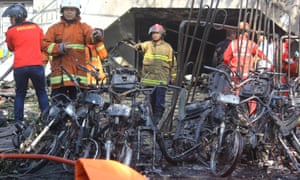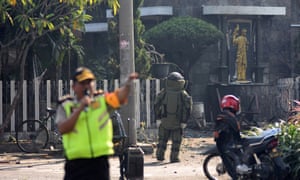Sunday, May 13, 2018
Just returned from Syria.. Indonesia church bombings: police say one family and their children behind attacks
Husband, wife and four children aged nine to 18 believed to be responsible for worst attack in more than a decade
At least 11 people have been killed and dozens injured in multiple suicide bombings at three churches in Surabaya, Indonesia’s second-largest city, in a coordinated attack police said was carried out by one family and their children.
The Indonesian police chief, Tito Karniavan, told reporters that investigators believed one family – a husband and wife, and their four children aged between nine and 18 – were the perpetrators of the worst attack the country has seen in more than a decade.
The first explosion at the Santa Maria Catholic church, which killed four people, was followed by attacks at the Surabaya Centre Pentecostal church and GKI Diponegoro church minutes later on Sunday.
Police identified the mother as Puji Kuswanti and said that she and her two daughters, Fadila Sari, 12, and Pamela Rizkita, nine, bombed the GKI Diponegoro church.
At the same time, the family’s two teenage sons, Yusuf, 18 and Alif, 16, rode motorcycles close to the entrance of the Santa Maria Catholic church, where they detonated their bombs. Their father, Dita, drove a car bomb into the Surabaya Centre Pentecostal church.
The blasts occurred within minutes of each other, just after 7.30am (0030 GMT) on Sunday morning as parishioners were heading into the churches for services.
Karniavan said he suspected the family involved had recently returned to Indonesia from Syria, where hundreds of Indonesians have travelled to join Islamic State, including entire families.
Isis claimed responsibility for the attacks through its media agency, Amaq, but did not produce any evidence for the claim.
President Joko Widodo joined Karniavan on a visit to the scene in Surabaya on Sunday. They jointly condemned the attacks as barbaric.
East Java’s police spokesman, Frans Barung Mangera, said 41 injured people were sent to hospital on Sunday, among them two officers who were guarding the churches.
The coordinated attacks in the predominantly Muslim country came days before the start of the holy fasting month of Ramadan.
Indonesian intelligence agency officials said they suspected the Isis-inspired group Jemaah Ansharut Daulah (JAD) was behind the assaults. The militant group is headed by Indonesia’s leading Isis proponent, Aman Abdurrahman, who is said to have ordered the 2016 Sarinah attack in Jakarta, which killed eight people.
Sunday’s attacks follow a deadly prison riot at a maximum-security detention facility in West Java last week, when Islamist inmates killed five officers after taking them hostage, and controlled three prison blocks for 40 hours.
The church attacks were probably linked to the prison hostage standoff, said Wawan Purwanto, the communication director at Indonesia’s intelligence agency.
“The main target is still security authorities, but we can say that there are alternative [targets] if the main targets are blocked,” he said.
News of the riot at the Mako Brimob detention centre, for which Isis also claimed responsibility, has reverberated through jihadist networks, said Todd Elliot, a Jakarta-based security analyst from Concord Consulting.
“Whatever happened in Mako Brimob has certainly reinvigorated domestic militants. Online jihadi social media has been abuzz in the last couple of days with celebratory messages and calls for more attacks,” said Elliot.
However, the degree of coordination – multiple bombings at three locations just minutes apart – suggests the Surabaya attack was well planned.
“As far as the capabilities of Indonesia jihadists, this was definitely a well-organised and well-coordinated attack,” said Elliot.
Sidney Jones, a terrorism analyst, reinforced that view. “This is the deadliest attack that Isis supporters have been able to mount so far,” she said in a text message. “Most of their earlier bombing attempts failed.”
Another terrorism analyst, Noor Huda Ismail, who has been monitoring the chatter of extremist networks on social media, said Indonesian women have been expressing increasing desire to get more involved in violent extremism.
On Sunday, those same networks discussed the woman allegedly involved in the Surabaya attacks. If confirmed, it would be the first time a woman has detonated a suicide bomb in Indonesia.
“It will change the whole landscape of radicalisation in Indonesia because first when you are a woman involved it sends a message … ‘I open up jihad for you’.”
Hours before Sunday’s attacks, Indonesia’s counter-terrorism squad shot dead four suspected terrorists from the JAD network in Cianjur, West Java. Police seized two handguns and three bags containing explosives.
Police ordered the temporary closure of all churches in Surabaya on Sunday, and a large food festival in the city was cancelled.
Indonesia is home to significant numbers of Christians, Hindus and Buddhists but there are concerns over rising intolerance. Extremists have mounted a series of attacks against Christians and other minorities in recent years.
Indonesian police shot and wounded a man who attacked a church congregation in Sleman town with a sword during Sunday mass in February. The radical Islamist, who had wanted to fight with Isis in Syria, injured four people.
Sunday’s attacks were the deadliest since 2005, when a series of car bombs killed 23 people on the resort island of Bali. The worst terror attack in Indonesia was the Bali bombing of 2002, when 202 people were killed.
Agence France-Presse and Reuters contributed to this report
Labels:
anti Christian,
Islamists,
terrorism
Subscribe to:
Post Comments (Atom)






No comments:
Post a Comment